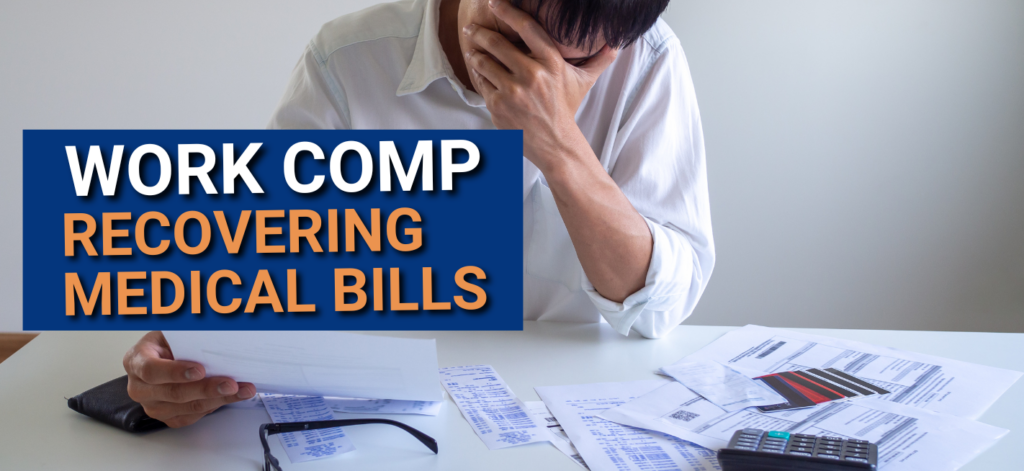Workers Comp Not Paying Medical Bills | How Ethen Ostroff Law Can Help
Workers’ compensation, or workers’ comp, is vital for financially safeguarding employees. In cases of work-related injuries or illnesses, it provides financial support for their medical costs and lost wages. However, there are instances where workers’ comp leaves individuals struggling with unpaid medical bills and financial uncertainties, despite its benefits. Our comprehensive guide explores the intricacies of workers’ comp, including its purposes, users, eligibility criteria, and the common challenge of workers’ comp not paying medical bills. Discover the reasons for denial and how Ethen Ostroff Law can assist you in facing these challenges head on.
What Exactly Is Workers' Compensation?
Workers’ compensation is a state-mandated insurance program that helps employees with work-related injuries or illnesses. The program ensures a smooth compensation process after workplace accidents, providing medical care and financial support to injured or ill workers while protecting employers from potential lawsuits. Each state has its own program with specific rules.
Benefits of Workers' Compensation
Workers’ comp provides vital benefits for employees and employers, addressing the aftermath of work injuries or illnesses. Key benefits include:
- Death benefits: It provides death benefits, covering funeral expenses and offering ongoing financial support to dependents for a work-related fatality.
- Disability benefits: It compensates for lost wages during recovery or long-term impairment for temporary or permanent disabilities.
- Legal protection: It shields employers from potential lawsuits by injured employees, generally forfeiting workers’ right to sue for negligence.
- Lost wages compensation: Fundamental financial support to employees unable to work due to work injuries or illnesses.
- Medical coverage: It covers medical expenses related to work injuries or illnesses.
- Rehabilitation services: It covers vocational rehabilitation services like job retraining and assistance in finding suitable employment.

Medical Bills Workers' Compensation Cover
Workers’ compensation covers various medical expenses for work injuries or illnesses. Here are the key bills it typically covers:
- Ambulance services.
- Diagnostic tests.
- Doctor’s visits.
- Emergency room visits.
- Home healthcare services.
- Hospitalization.
- Medical equipment.
- Mental health treatment.
- Physical therapy sessions.
- Prescription medications.
- Prosthetic devices and orthotic aids.
- Vocational rehabilitation services.
- Travel expenses associated with receiving medical treatment for work injuries.
Who Benefits from Workers' Compensation?
Workers’ comp is a resource for individuals across professions and industries. It provides a safety net for needed medical care and financial support after work injuries or illnesses. It benefits:
- Education sector professionals.
- Healthcare workers.
- Information technology professionals.
- Manual labor industry workers in construction, manufacturing, and agriculture.
- Office and administrative employees.
- Public service professionals.
- Retail workers.
- Service industry employees.
- Transportation industry workers.
What Are Considered Work Injuries?
Work injuries encompass various physical or mental conditions occurring during employment in the performance of job-related duties. Common types include:
- Assault or violence.
- Burns and electrocutions.
- Chemical exposures.
- Exertion injuries.
- Heat-related injuries.
- Injuries caused by falling objects.
- Injuries sustained during work-related events or activities.
- Injuries sustained by slips, falls, or trips.
- Machine-related injuries.
- Occupational diseases.
- Physical trauma.
- Psychological injuries.
- Repetitive stress injuries.
- Vehicle accidents.
Medical Establishments Authorized by Workers' Compensation
Workers’ comp covers medical treatment provided by authorized healthcare providers. Workers are typically required to seek treatment from them to ensure coverage. Here are the types of medical establishments and professionals you can use for treatment under workers’ comp:
- Chiropractors.
- Diagnostic facilities.
- Durable medical equipment providers.
- Hospitals.
- Medical specialists.
- Mental health professionals.
- Occupational medicine clinics.
- Pharmacies.
- Physical therapists.
- Primary care physicians.
- Rehabilitation centers.
- Urgent care centers.

What to Do After a Workplace Injury?
Experiencing a work injury can be disorienting, but taking prompt and appropriate action is crucial. Here is a guide:
- Get immediate medical attention.
- Report the injury to your employer promptly.
- Complete any required incident report or paperwork provided by your employer.
- Get witnesses’ contact information, if any.
- Take photos or videos of the scene.
- Maintain detailed records of medical treatments.
- Follow medical advice.
- Consult with a workers’ comp medical bill lawyer.
- File a workers’ comp claim.
- Familiarize yourself with your rights under workers’ comp laws in your state.
- Keep all documents related to your injury.
- Attend any requested medical exams by the insurance company.
- Keep open communication with your employer, insurance company, and healthcare providers.
- Avoid providing recorded statements to insurance adjusters without consulting your attorney.
Steps for Filing a Workers' Compensation Claim
Filing of a workers’ comp claim involves quick reporting, medical care, and thorough documentation. Follow these simplified steps for a smooth process:
- Quickly inform your employer to protect your claim.
- Get prompt treatment and inform the provider.
- Submit a written notice of injury to your employer. Keep a copy.
- Obtain and accurately fill out the claim form, then submit it to your employer and/or to the workers’ comp insurance carrier.
- Consider consulting an attorney for guidance.
- The insurance carrier will review your claim. If approved, you will receive benefits for medical expenses and wage replacement.
- If denied or if you disagree with benefits, follow the appeals process.
- Attend requested medical exams by the insurance company to assess injuries.
- Keep stakeholders informed of changes in your health, treatment, or work status.
- Once cleared, return to work within restrictions, communicating any ongoing challenges.
- Organize records of communications, medical documents, bills, and receipts for the entire claims process.
Duration of Workers' Compensation for Medical Costs
How long workers’ compensation pays for medical bills depends on factors like the injury, state laws, and healthcare recommendations. Key points include:
- Maximum Medical Improvement (MMI): Coverage often lasts until reaching MMI when health stabilizes.
- Chronic conditions: Extended coverage may apply for ongoing care of chronic conditions resulting from work-related injuries.
- Scheduled follow-up appointments: Treatment plans, follow-ups, tests, and treatments are usually covered, emphasizing compliance for sustained benefits.
- Rehabilitation services: Coverage may continue for rehabilitation services, like physical therapy, crucial for recovery and return to work.
- Authorized providers: Stick to approved healthcare providers to ensure continued coverage and avoid risking benefits.
- Legal proceedings and settlements: Coverage duration may be influenced by legal processes or settlements, potentially covering ongoing expenses.
- Return to work: If returning to work, workers’ compensation may continue covering medical bills tied to rehabilitation and necessary accommodations.
Stay in touch with healthcare providers, follow recommended treatments, and report changes to employers and insurers. Understand state-specific laws and consult a workers’ compensation attorney for concerns about benefit continuation.
Steps to Take If Workers' Comp Not Paying Medical Bills
If workers’ comp not paying medical bills, follow these steps:
- Ask your workers’ comp insurance carrier about your claim and non-payment reasons.
- Keep records of all communications with the insurance carrier.
- Verify your workers’ comp claim status.
- Discuss the issue with your employer if it persists.
- If bills remain unpaid, consult a workers’ comp medical bill lawyer for advice.
- File a workers’ comp complaint following your state’s regulations.
- Collect evidence related to your medical treatment and communications.
- If informal resolutions fail, consider a formal hearing before a workers’ comp judge.
- Explore mediation for dispute resolution.
- Familiarize yourself with the workers’ comp laws in your state.

Reasons Behind Denied Workers' Compensation
Facing a denied workers’ compensation claim is frustrating, especially when you need support the most. To prevent future denials, familiarize yourself with these common reasons for rejected claims:
- Delayed reporting of a work-related injury.
- Employee refuses to cooperate with the process.
- Employer alleges willful misconduct or violation of safety rules.
- The employer disputes the claim’s validity.
- Failing to meet state-specific deadlines for filing workers’ comp claim.
- Failing to seek timely medical treatment for work-related injury.
- Failing to submit necessary documentation.
- Independent medical exam findings dispute injury severity or causation.
- Injuries off-duty or outside normal work premises are challenged as not work-related.
- Injury is attributed to a pre-existing condition.
- Providing inaccurate information on forms.
Dealing with a Denied Workers' Compensation
A denied workers’ comp claim can be challenging, but here is a simplified guide on what to do:
- Read the denial letter carefully. Understand the reasons and the appeal process.
- Identify specific reasons, like disputes over causation or missed deadlines.
- Collect relevant documents—medical records, incident reports, and witness statements.
- Get guidance from an attorney to assess your case and navigate the appeals process.
- Submit a formal appeal following guidelines in the denial letter.
- Fill in the required appeal forms and provide additional requested documentation.
- If needed, organize evidence, and have a clear statement ready.
- Explore alternative dispute resolution, like mediation, for a potential resolution.
- Despite the denial, they keep seeking necessary medical treatment and document expenses.
- If denial is based on medical evidence, consider getting a second opinion.
- Explore other legal options, like a lawsuit against a third party, with your attorney.
- Stay updated on your appeal’s progress and keep open communication with relevant parties.
Remember, workers’ compensation laws vary, so know your local regulations. Seeking legal advice early can improve your chances of success.
Options for Medical Costs in a Disputed Workers' Compensation
If your employer disputes your workers’ comp claim, leaving you without medical bill coverage, consider these alternative solutions:
- Appeal the denial, provide extra documentation during the process, and continue medical treatment.
- Auto insurance (if applicable).
- Check eligibility for temporary disability benefits or state-funded programs.
- Consult a workers’ comp attorney to address denials and seek rightful compensation.
- Discuss payment plans or discounts with providers to manage costs.
- Explore community clinics or organizations offering low-cost medical services.
- If eligible, use Medicare or Medicaid to cover injury-related medical costs.
- Research local charities that may assist with medical expenses.
- Use your employer’s disability insurance or unpaid leave to cover medical costs.
- Use personal health insurance to pay for medical bills during the contested claim.
- Utilize funds from the Health Savings Account or Flexible Spending Account for eligible medical expenses.
How Ethen Ostroff Law Can Help
Ethen Ostroff Law is here to assist if you are facing unpaid medical bills due to workers’ comp issues. Our team offers legal expertise, dispute resolution, and support to guide you through the claims process. Let us help you secure the benefits you deserve. Schedule your free consultation now!
Related Questions on workers comp not paying medical bills
Q1: What happens to medical bills when workers' comp is denied?
A1: When workers’ comp is denied, you may need to find alternative ways to cover medical bills. Try using personal health insurance, negotiating with healthcare providers, or consulting with a workers’ comp attorney to appeal the denial.
Q2: When injured at work who pays medical bills?
A2: When injured at work, medical bills are typically covered by workers’ comp. Report the injury promptly to your employer and follow the workers’ comp process to ensure coverage for necessary medical treatments.
Q3: Does workers' comp cover medical bills?
A3: Yes, workers’ comp generally covers medical bills related to work injuries or illnesses. The coverage includes expenses for doctor visits, treatments, surgeries, and other necessary medical care to aid in recovery.


